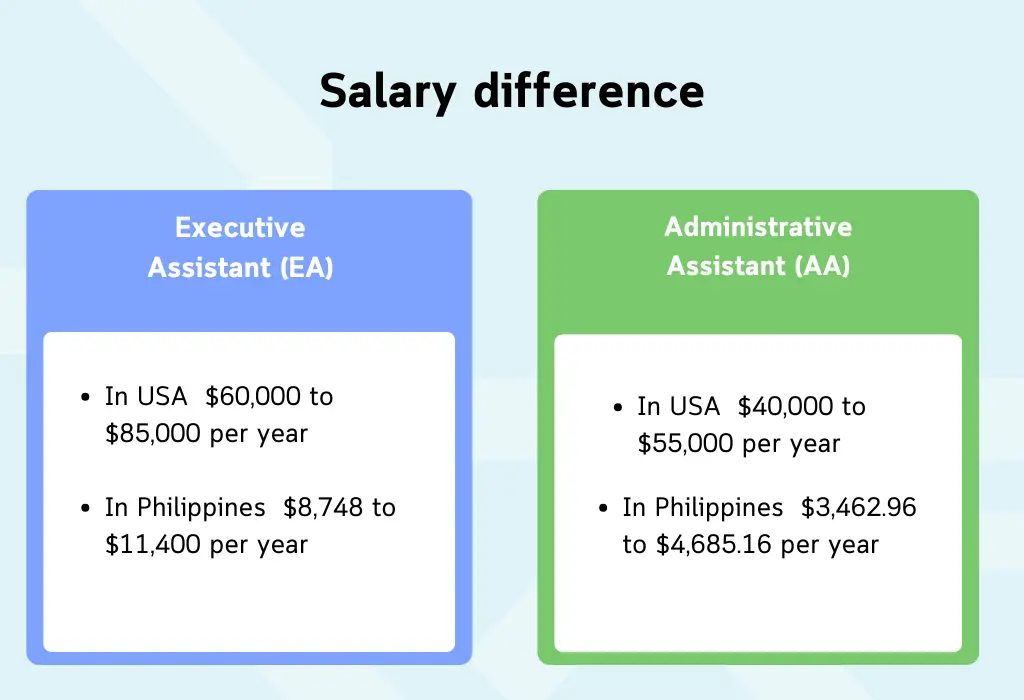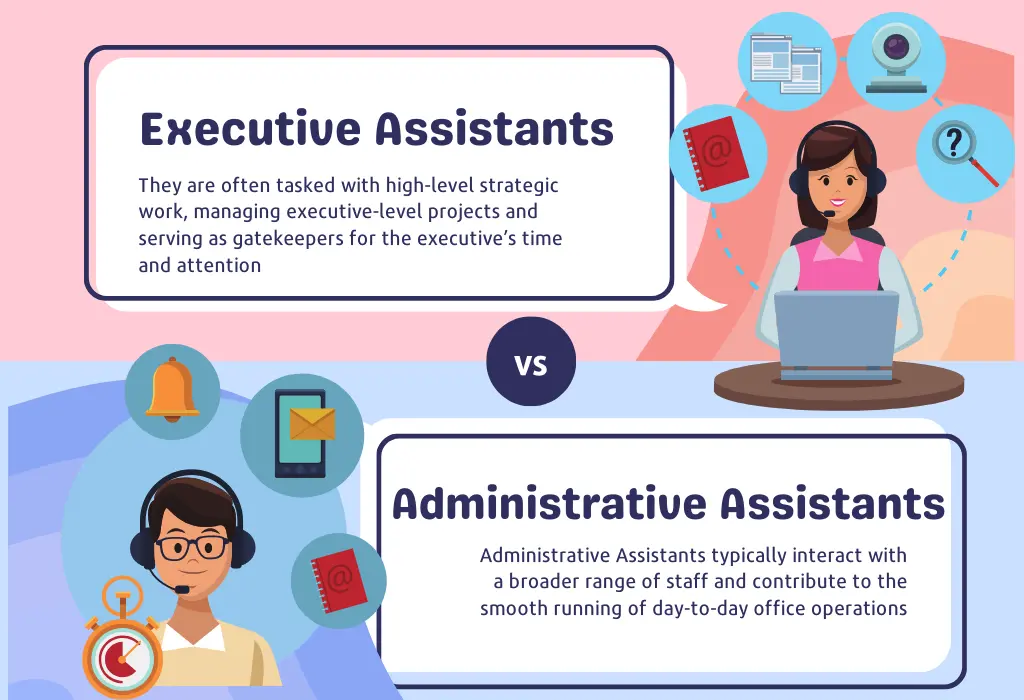Understanding the Differences Between Executive and Administrative Assistants
When it comes to office support roles, two positions often create confusion: the Executive Assistant (EA) and the Administrative Assistant (AA). While both are essential to maintaining smooth office operations, they serve different purposes and require distinct skill sets and responsibilities.
In this blog, we’ll explore the key differences between these roles and how they contribute to the success of an organization.
Key Takeaways:
- Executive Assistants (EAs) are involved in high-level tasks, supporting senior executives, while Administrative Assistants (AAs) handle more general office management duties.
- While there’s overlap in their duties, an Executive Assistant often deals with complex scheduling, strategic projects, and confidential information.
- Salary differences between EAs and AAs reflect the scope and complexity of their responsibilities.
What is an Executive Assistant (EA)?
An Executive Assistant is a senior-level administrative professional who provides comprehensive support to high-level executives, such as CEOs or COOs. EAs typically handle:
- Complex scheduling
- Coordinating meetings
- Organizing travel arrangements
- Managing confidential documents
They are often tasked with high-level strategic work, managing executive-level projects, and serving as gatekeepers for the executive’s time and attention.
What is an Administrative Assistant (AA)?
An Administrative Assistant provides general office support, which involves:
- Answering phones
- Scheduling meetings
- Maintaining office supplies
- Handling basic administrative tasks
Administrative Assistants interact with a broader range of staff and contribute to the smooth running of day-to-day office operations.
Executive Administrative Assistant vs Executive Assistant
While these roles may sound similar, the role of an Executive Administrative Assistant (EAA) is typically more comprehensive:
- Executive Administrative Assistant: A broader role that involves both executive support and general office administration.
- Executive Assistant: Primarily focused on supporting the executive in complex, high-level tasks, including project management and decision-making.
Key Responsibilities of Each Role

Executive Assistant (EA):
- High-Level Scheduling: Managing the complex schedules of senior executives.
- Travel and Expense Coordination: Arranging travel plans and processing expenses.
- Confidential Documents: Handling confidential information and reports.
- Strategic Support: Working on high-level projects, from organizing meetings to managing communications.
- Stakeholder Representation: Representing the executive in meetings or communications with other stakeholders.
Administrative Assistant (AA):
- General Office Management: Answering calls, managing calendars, and maintaining office supplies.
- Routine Scheduling: Organizing internal team meetings and appointments.
- Clerical Tasks: Filing documents, preparing reports, and supporting team members.
- Office Logistics: Ensuring smooth operations of day-to-day office activities, like managing office equipment and supplies.
Executive Assistant vs Administrative Assistant Salary

The salary for Executive Assistants and Administrative Assistants varies significantly due to the level of responsibility in each role. EAs typically earn more due to their strategic support and higher-level tasks. According to recent data:
- Executive Assistant Salary: $60,000 to $85,000 per year (depending on experience and location).
- Administrative Assistant Salary: $40,000 to $55,000 per year.
Salary Insights:
- Executive Assistants earn a premium due to their expertise and involvement in high-stakes decision-making.
- Administrative Assistants, while vital to the office’s day-to-day operations, earn less as their tasks tend to be more routine.
Executive Assistant vs Secretary: What’s the Difference?
The distinction between an Executive Assistant and a Secretary often depends on the organization. Traditionally, Secretaries were responsible for clerical tasks such as answering phones, typing, and managing schedules. Today, many of these responsibilities fall under the title of Administrative Assistant or Executive Assistant.
Executive Assistants are more likely to be involved in high-level decision-making and strategic tasks than Secretaries, who are more focused on routine clerical work.
Executive Assistant vs Personal Assistant
Although Executive Assistants and Personal Assistants share some similarities, such as managing schedules and correspondence, they differ in scope:
- Personal Assistants: Typically manage personal affairs and tasks for executives (e.g., running errands, scheduling personal appointments).
- Executive Assistants: Focus on business-related tasks, such as managing executive-level projects, making strategic decisions, and coordinating office activities.
Is an Executive Assistant an Administrative Professional?
Yes, an Executive Assistant is considered an administrative professional, though their role is typically more advanced and strategic compared to general administrative duties like those of a receptionist or office assistant. They are expected to have specialized skills in project management, communication, and decision-making, and they often act as a trusted partner to executives.
Conclusion: Which Role is Right for You?
Choosing between an Executive Assistant and an Administrative Assistant role depends on the level of responsibility you’re ready to take on. If you’re looking to support top-level executives and take on complex, strategic tasks, the Executive Assistant role may be the best fit for you. On the other hand, if you prefer general office management and supporting team-wide operations, the Administrative Assistant role may be more suitable.
Both roles are critical to organizational success, but they cater to different needs. Whether you’re hiring or considering these positions for your career, understanding the differences will help you make an informed decision.
Looking for Expert Executive Assistance?
If you’re seeking a highly skilled Executive Virtual Assistant, look no further. At Amazing VA Partners, we connect businesses with top-tier virtual assistants to provide seamless executive support. Get in touch today to learn more about how our Executive Assistants can help streamline your business operations and support your strategic goals.
About the author
What software skills should an Executive Assistant have?
An Executive Assistant should be proficient in tools like Microsoft Office, Google Workspace, CRM systems, and project management software like Asana or Trello to manage tasks efficiently and assist executives in day-to-day operations.
Is the role of an Executive Assistant more demanding than an Administrative Assistant?
es, Executive Assistants typically handle more complex responsibilities, such as managing confidential information, coordinating executive-level projects, and providing support to top leadership, making their role more demanding than that of an Administrative Assistant.
Can an Executive Assistant handle administrative tasks?
Yes, an Executive Assistant often takes on some administrative tasks, such as scheduling meetings or preparing documents, but they are also responsible for high-level executive support, which sets them apart from a typical Administrative Assistant.
Can an Administrative Assistant become an Executive Assistant?
Yes, with the right experience, skills, and professional development, an Administrative Assistant can transition into an Executive Assistant role. This may involve taking on more responsibility, such as managing high-level meetings and overseeing complex projects.
An Executive Assistant should be proficient in tools like Microsoft Office, Google Workspace, CRM systems, and project management software like Asana or Trello to manage tasks efficiently and assist executives in day-to-day operations.
es, Executive Assistants typically handle more complex responsibilities, such as managing confidential information, coordinating executive-level projects, and providing support to top leadership, making their role more demanding than that of an Administrative Assistant.
Yes, an Executive Assistant often takes on some administrative tasks, such as scheduling meetings or preparing documents, but they are also responsible for high-level executive support, which sets them apart from a typical Administrative Assistant.
Yes, with the right experience, skills, and professional development, an Administrative Assistant can transition into an Executive Assistant role. This may involve taking on more responsibility, such as managing high-level meetings and overseeing complex projects.








One Response
Good day! I know this is somewhat off topic but I was wondering if you knew where I could
get a captcha plugin for my comment form? I’m using the same blog platform as yours and
I’m having problems finding one? Thanks a lot!
casino en ligne
You’re so awesome! I don’t think I have read through a single
thing like that before. So nice to discover somebody with unique thoughts on this topic.
Really.. thanks for starting this up. This website is one thing that is required on the web, someone with a little originality!
casino en ligne
Having read this I believed it was rather informative.
I appreciate you finding the time and energy to put this short article
together. I once again find myself personally spending a lot of time both reading
and commenting. But so what, it was still worth it!
casino en ligne
We’re a group of volunteers and opening a new scheme in our
community. Your site offered us with valuable info to work on. You
have done an impressive job and our entire community will be thankful to you.
casino en ligne
Attractive section of content. I just stumbled upon your site and in accession capital
to assert that I get in fact enjoyed account your blog
posts. Anyway I’ll be subscribing to your feeds and even I achievement you access consistently quickly.
casino en ligne
Hi there! Do you know if they make any plugins to help with Search
Engine Optimization? I’m trying to get my blog to rank for
some targeted keywords but I’m not seeing very good results.
If you know of any please share. Thank you!
casino en ligne
Definitely believe that which you said. Your favorite justification appeared
to be on the net the simplest thing to be aware of.
I say to you, I definitely get annoyed while people consider worries
that they plainly do not know about. You managed to hit the nail upon the top and defined out the
whole thing without having side effect , people can take a signal.
Will likely be back to get more. Thanks
casino en ligne
I always spent my half an hour to read this weblog’s content
all the time along with a cup of coffee.
casino en ligne
Woah! I’m really loving the template/theme of this site.
It’s simple, yet effective. A lot of times it’s difficult to get that “perfect balance” between superb usability and appearance.
I must say you’ve done a excellent job with this.
Also, the blog loads extremely fast for me on Firefox. Exceptional Blog!
casino en ligne
I’m truly enjoying the design and layout of your blog.
It’s a very easy on the eyes which makes it
much more pleasant for me to come here and visit more
often. Did you hire out a developer to create your theme?
Superb work!
casino en ligne